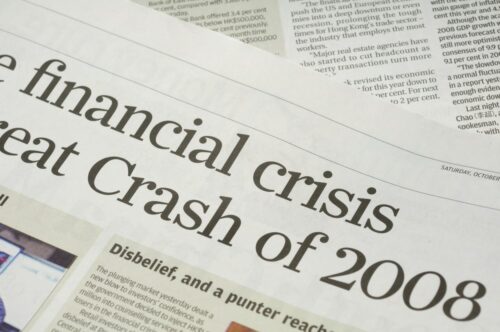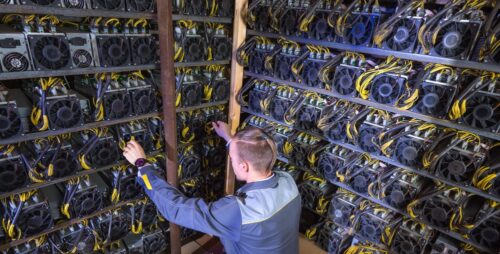What Christians need to know before investing in Bitcoin
Drive two hours north of New York City, and you enter the stunningly beautiful New York State. A land of sweeping mountain backdrops, crystal clear lakes, and home to exquisite Riesling wines. It’s also home to the less exquisite Greenidge Generation coal-fired power station. This power station, previously shutdown, is once more firing at full capacity, but not to heat homes or boil kettles. It’s mainly to mine Bitcoin.

Source: NBC News
Bitcoin is just one of hundreds of new “cryptocurrencies” that have made headlines in recent years as its value has soared several thousand percent (and occasionally plummeted). Many countries including the UK, US, and EU nations already accept Bitcoin payments in limited use but it’s growing, fast. In April, UK Chancellor, Rishi Sunak, announced his intention for the UK to become a global hub for cryptocurrency investment. He said:
We want to see the [cryptocurrency] businesses of tomorrow – and the jobs they create – here in the UK … Rishi Sunak
Some commentators believe cryptocurrencies are the world’s strongest currencies and a solution to developing world poverty. Others say they’re a harbour for criminal activity and an environmental disaster. What’s the truth? And what do Christians need to know about these new powerful forms of payment?
Out of the ashes
In the aftermath of the 2008 global financial crash, Satoshi Nakamoto (a pseudonym for persons unknown) proposed a vision for a completely new currency: Bitcoin. It would not depend on banks that can fail disastrously, in fact, it wouldn’t depend on banks at all. It would be a new form of tender, independent of any organisation or government; a decentralised, democratic, resilient currency, managed by its users.
Out of this vision, Bitcoin, the world’s first, and biggest cryptocurrency emerged. But …
Where do Bitcoins actually come from?
Think about gold. Gold is mined by digging a hole in the ground or panning in a stream. If you are very lucky, you might find gold. Bitcoins are also mined, but not by digging holes. They are “mined” by getting your computer to solve a complex mathematical puzzle set by the Bitcoin system. Each time a puzzle is solved, everyone agrees that the person who solved it owns an additional Bitcoin. This will continue until all Bitcoin solutions have been found — a maximum of 21 million.
And there’s another similarity to gold. Gold doesn’t have any value in itself, it’s just a shiny metal you find in the ground. It has value because, as individuals and nations, we all agree that it does. On the basis of that agreement, we use gold to barter for goods. Similarly, enough people have agreed that these “Bitcoins” have a value, so it has become a currency, and you can use it to buy and sell on the internet. In fact a Bitcoin is (today) worth around £36,000!
But hang on! Can anyone “mine Bitcoin” and get rich? Yes — just Google “bitcoin mining software” and download it to your laptop! But before you give up the day job, note that an average laptop running 24x7 will take years to find one solution, or Bitcoin. You need a warehouse full of high-end computers to have a chance. … Similarly, anyone can buy a spade and dig for gold, but you probably won’t find any, you need serious mining equipment.
Can anyone “mine Bitcoin” and get rich?
How do people buy and sell using Bitcoin?
Cryptocurrencies are not physical currencies they are electronic (the images you see of “Bitcoins” are made up). That’s nothing new. Over 90 percent of your financial transactions are already electronic, ones and zeros whizzing through your account. When you buy an item with a card, the bank updates your account but no physical money (or gold!) changes hands. Similarly, Bitcoin is an electronic currency with an agreed value. Advocates therefore argue that Bitcoin and other cryptocurrencies are simply the logical next step in payments.
But there is one difference in paying with Bitcoin.
With Bitcoin, no central organisation takes care of transactions. There is no bank, no Mastercard, no PayPal etc managing your account. These organisations may accept Bitcoin transactions but they don’t manage them. Instead, every computer in the world mining Bitcoin also stores an encrypted record of every transaction that has ever taken place. This is mind-boggling, but it works. We call this online ledger of transactions “the Blockchain”.
It’s nearly impossible to hack the Blockchain as you would need to attack millions of computers worldwide, simultaneously. That makes Bitcoin transactions incredibly secure. Removing the middle man (the bank) also makes this system efficient, cheap, and fast.
Lastly, Bitcoin is just one of hundreds of new “cryptocurrencies”. It’s the one people have heard of but others include Ethereum, Solana, Cardano, and Dogecoin.
It’s mind-boggling, but it works!
But what are the ethical allegations made against cryptocurrencies?
Frying the planet?
Traditional Bitcoin mining uses colossal amounts of electricity to run hundreds of computers, with vast amounts of cooling, to solve Bitcoin puzzles and store transactions. One person in my town mines cryptocurrencies in his basement. He has 168 computers running 24x7, and hasn’t turned his heating on for two years!
People are most likely doing the same in your town, too. In fact, according to the Cambridge Centre for Alternative Finance, global Bitcoin mining alone consumes more energy per year than the whole of Malaysia or Sweden. One town in the US has even banned its residents from Bitcoin mining as it was exhausting the electricity supply and pushing up prices.
In the current climate (pun intended), it’s difficult to justify using thousands of computers to solve puzzles. There is a way forward: green cryptocurrencies. Some of these use renewable energy sources for running computers, but that is still electricity that could be used to heat a home or run a factory. Other options are genuinely green, working entirely without need for number-crunching, and requiring minimal energy.
One person in my town mines cryptocurrencies in his basement. He has 168 computers running 24x7, and hasn’t turned his heating on for two years!
Aiding criminals?
Since cryptocurrencies operate outside of traditional banking models, they are often accused of offering a natural home for criminal activity. This could potentially include the sale of illegal weapons, drugs or ransomware (where a message appears on your laptop demanding a ‘ransom’ or your fils get wiped). It’s easier to demand payment in a global currency where the transactions are instantaneous. Cryptocurrencies also stand accused of being favoured by autocratic regimes, including Russia and North Korea. Both Europol and the UK’s National Crime Agency have warned of money laundering through the use of crypto mixers — software that combines coins from different wallets together, shuffles them and redistributes them — making it hard to trace the origins.
But this has not been proven. And, since the Blockchain maintains a permanent record of all transactions, Bitcoin supporters argue its traceability actually makes it better at uncovering scams and criminality. There are ways to get around Blockchain safeguards, of course — as with all cybercrime, it’s a question of law enforcement keeping up with the cyber criminals.
Cryptocurrencies stand accused of offering a natural home for criminal activity
Helping the developing world?
Our traditional payment systems exclude people with no bank account – including billions in the global south. Even if you have an account, it’s expensive and time-consuming to wire money from a western country home to a developing country. Cryptocurrency transactions take place at almost no cost, are incredibly fast, and don’t need a bank account. Great for sending money, great for securing a small loan without a bank account.
However, in my view, there is little evidence of this use becoming widespread and cryptocurrencies have been around for over a decade. Moreover, other payment systems are already proven and more widespread. For example, M‑Pesa, invented by Vodafone Kenya (Safaricom) in 2007, is a simple mechanism already used across 200 countries to send money between individuals with nothing more than a mobile phone. It just works.
Having said that, cryptocurrencies can benefit developing nations where there is hyperinflation or where foreign currency is difficult to obtain. If you live in a country where the inflation is a thousand percent, cryptocurrencies can actually appear stable. In that case, placing some of your savings into, say, Bitcoin, may help prevent them being inflated away. Some nations such as El Salvador have declared Bitcoin to be legal, commonly accepted tender. This is a good use of cryptocurrency.
If you live in a country where the inflation is a thousand percent, cryptocurrencies can appear stable
Encouraging greed?
Cutting to the chase, rather than helping the poor, for many this is more like the rich getting richer. Cryptocurrency feels more like gambling than investing, and, like gambling, only a few will win. Some may argue that, over the past two years, our pension investments have suffered extreme volatility anyway, but cryptocurrency takes investing to a new level of risk.
What does the Bible say about cryptocurrency?
Nothing — obviously, cryptocurrency didn’t exist in Jesus’ day. But money did, and here the Bible has a lot to say. In fact, money is one of the top‑5 topics that Jesus spoke about.
Jesus told his followers not to become obsessed with accumulating more, or let wealth become an idol (see the story of the rich young ruler in Matthew 19 and the parable of the rich fool in Luke 12). We are to deal with others with integrity and honesty (think of the calling of Matthew and Zacchaeus). And we are to invest our “talents” well (Matthew 25), somehow being “as shrewd as snakes and as innocent as doves” (Matthew 10:16) while also using our gains to help others. Many other parts of the Bible speak into this topic – such as the instruction in James 4 to avoid get-rich-quick schemes.
Ultimately, making money by investing, even speculating, is not un-Christian and neither is being rich. But the way we make our gains — at whose cost? — and what we do with the wealth we gain, show what kind of Christian we are.
So … is it OK for Christians to invest in cryptocurrencies?
Without doubt, there is a revolution taking place in the way we pay for goods, like it or not. Due to the pandemic, we have already seen a global shift in money from hard cash to contactless payment, and you don’t see many churches going back to plate collections. Cryptocurrency is the next wave of this revolution. It will become less volatile, more mature and, could dramatically impact our day-to-day lives.
Holding all this together is challenging, and Christians will draw their own conclusions. But we do have a choice. We can decide if we will simply be users of new monetary systems, or investors. If you enjoy speculating, say you have pension funds in high risk, “Category 10 Risk” funds, and are happy with the ethics, then green cryptocurrency investments may be an option for you.
Alternatively, why wouldn’t we invest in well-established, ESG (Environmental, Social and Governance) funds, where the ethics are clearer? Then you are also investing, hopefully, to provide someone with a job, or a mortgage or factory equipment to employ people, rather than simply waiting for the price of a Bitcoin to rise.
But isn’t it just worth a flutter? Someone said to me recently “if you can afford to lose money why wouldn’t you invest in Bitcoin?” My answer is: if you can afford to lose money, why don’t you just give it away?






Thank you for this article. For the first time I have some understanding on what cryptocurrancy is! Very interesting.
⭐⭐⭐⭐⭐
🙂
Thanks Chris I think you’ve written an excellent article. You’ve given a sufficient technical explanation for the baffled, and your moral points cover it well. I still struggle with the idea of valuing Bitcoins. I’ve always understood the value of money as equivalent to units of human work, some work being more or less valuable than others. But Bitcoin is completely unrelated to human work. It’s not really investment at all, much more like speculation or gambling. Your example of runaway inflation is about the only case I can see for buying it — because there the government has obviously broken… Read more »
Thanks Chris It seems to be that, at present the value of cryptocurrency is determined by market forces of supply and demand. In that sense it is like company shares except that share valuations are based on real life factors such as dividends, asset values and future growth prospects and these can be analysed to make sensible investment decisions. Cryptocurrency transactions feel more like gambling at present as they are purely based on which way you think the price will go next. I guess if cryptocurrencies came into general use alongside existing currency, then the price should stabilise and there would… Read more »
Thx John — I am not sure if addiction is an issue in cryptocurrencies.. I think there is always a risk of addiction when there is an apparently “get rich quick” scheme on offer.
Thanks Chris for another stimulating article! Nice balance of views expressed! My observation is that your blog would have had a much more positive spin on Bitcoin (and it’s positive ethical and environmental potentials) if you were of a younger generation. Over 90% of cryptocurrency buyers are Millenials or GenZ (aged 18 to 40). Why? Many of this generation feel let down — laden with student debt, housing unaffordable, the pension opportunities enjoyed by baby-boomers now gone. Interest in cryptocurrency is high across Central America, South America and Africa as a way of combatting high inflation rates. Even in the UK,… Read more »
Thanks Lester. That’s a good observation re the demographics of cryptocurrency investors. I agree there are some who feel let down by our financial systems as you point out. However, I suspect the main reason is their fluency with technology and the fact that they are “digital natives”, ie born into this kind of tech unlike most of us who .… find this digital world very strange, and after all were still using our cheque books until a few years ago! I think I discuss the “wise servant” idea in the article. Is a cryptocurrency investment wise? Or is it wiser… Read more »